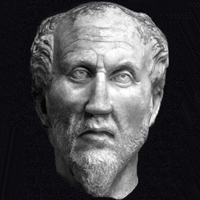Plotinus - Biography and Works
The last of great Greco-Roman philosopher Plotinus was born in Algeria. He liked philosophy as a result he started reading Platonic theory, Pythagorean theory, Aristotle, mysticism, stoicism etc. He read one Pythagorean theory 'Melan Psychosis'.

Plotinus (204-270)
According to this theory soul never died, it just migrate form one body to another from this he learned transmigration of the soul; He was highly influenced by this theory. After getting his education first in Alexandria then in Persia, he became a popular lecturer in Rome, advocating asceticism and the contemplative life, though he seemed to live in some style himself. At the age of 60, he tried to found a 'Platonopolis' modeled on Plato's utopian Republic, but the contemporary emperor stopped it. His prolific writings, produced between 253 and 270, were posthumously edited and arranged by his pupil Porphyry into six groups of nine books (or Enneads). These books established the foundation of 'Neo-Platonism', as a philosophical system combining Platonic with Pythagorean, Aristotelian and Stoic doctrines. He greatly influenced early Christian theology, and Neo-Platonism was the dominant philosophy in Europe for a millennium, establishing a link between ancient and medieval thought.
Plotinus says, 'Beauty presents itself the sense of Oneness (unity) when we perceive it'. As he had lived in 'Roman Empire', he observed the political turmoil when it started to collapse. His ecstasy was out of his body because of the situation he observed. He wrote Enneads and his concept of literature is revealed in ninth and tenth chapters of that book. He didn't believe in writing though he wrote it around 256, in his last span of life.
